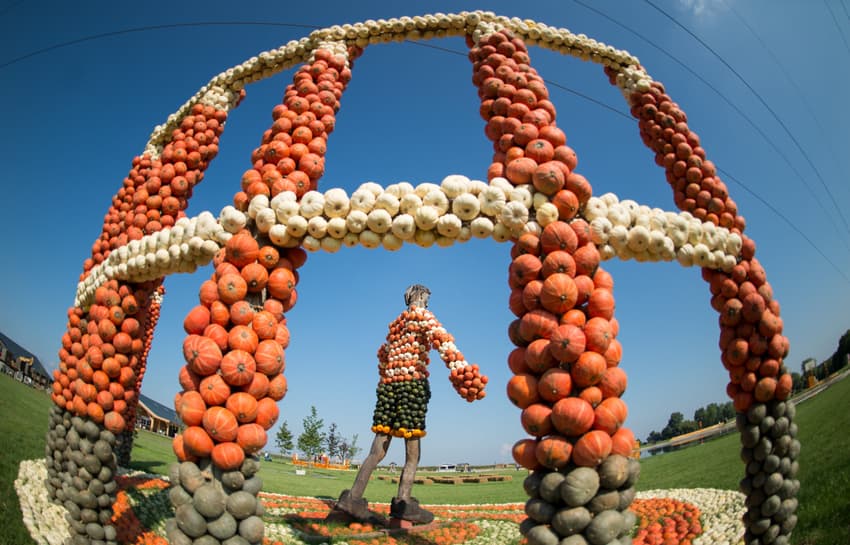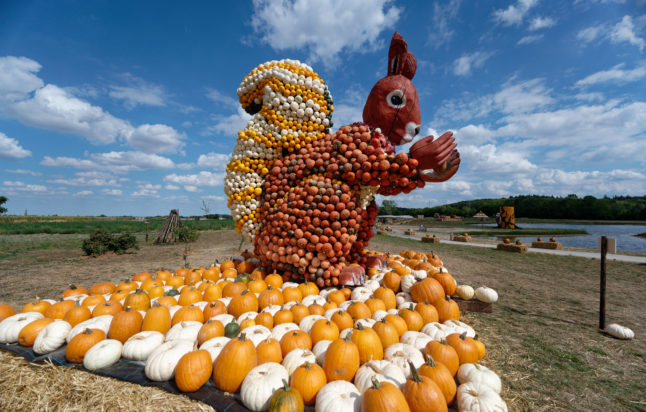This article is also sent out as a weekly newsletter to members every Saturday. To sign up and get it straight into your inbox just go to your newsletter preferences.
Living in Germany
For Members
Living in Germany: Life after the €9 ticket, dialect maps and Waldpilze

In this week's roundup of life in Germany, we look at the end of the hugely popular €9 ticket deal, a map of Germany's regional dialects and the start of the autumn mushroom-foraging season.
€9 ticket: People in Germany want change
Last week the €9 per month ticket offer came to an end. People in Germany enjoyed three months of travelling on buses, trams and trains in local networks all over the country at the massively reduced price. With around 52 million tickets sold, it’s been widely touted as a success story. Transport Minister Volker Wissing said this week that he had convinced his FDP colleague Christian Lindner that a follow-up ticket - and restructure of local public transport - was needed in Germany.
“By buying many tickets, people voted that it (public transport) shouldn’t stay this way, and that’s why I want us to simplify the public transport structures, digitalise them, and we need a better fare structure,” said Wissing. “There has to be something new.”
Lindner had previously ruled out the idea of a follow-up scheme, saying Germany couldn’t afford it. While it’s unlikely that we’ll have another nationwide ticket that’s so cheap, it would be encouraging to see public transport reduced in price from the current cost, and to see it simplified. The coalition government seems to be receptive - although it will still be a case of thrashing out how it can be funded together with the heads of the 16 federal states. Fingers crossed that we’ll see more positive changes to public transport in Germany soon.
READ ALSO: End of €9 ticket and fuel cuts – Germany says goodbye to cheap travel
Tweet of the week
At The Local we write about language a lot. But accents and dialects are also fascinating. This map is a guide to Germany’s different dialects, whether Hoch Deutsch (High German) or Sorbian.
https://twitter.com/simongerman600/status/1565460748498780164?s=20&t=z9tFWr3FkbBfRKzyAFxQbw
Where is this?

Photo: picture alliance/dpa | Henning Kaiser
Now that September is here, we are saying goodbye to summer. But not all is lost, because pumpkin season is around the corner. Embrace this time by checking out this squirrel formed from pumpkins, which is on display at the pumpkin exhibition (Kürbisausstellung) under the theme of "wondrous forest creatures" at Krewelshof in Mechernich, North Rhine-Westphalia.
Did you know?
Late summer and autumn is the time of year that lots of Germans love to go foraging for mushrooms - or Waldpilze. That’s because this season is when the best edible mushrooms poke through the undergrowth of forests so mushroom hunters can find them. In many cultures, looking for mushrooms isn’t very popular because of fears of getting poisoned. But Germans who do this as a hobby learn to distinguish between an edible and poisonous mushroom.
READ ALSO: What’s behind the German fascination with foraging for wild mushrooms?
However, searching for wild mushrooms is now such a popular past-time in Germany that you are only allowed to pick them for personal use. Keep in mind that Bavarians call mushrooms Schwammerl, which means literally “little sponge” - so you may hear this word depending on the region you’re in. Our advice if you want to get involved with this hobby? Always go with someone who knows how to forage so you don’t end up with any poisoned mushrooms. Alternatively, head to a restaurant and enjoy Waldpilze on the menu.
Comments
See Also
€9 ticket: People in Germany want change
Last week the €9 per month ticket offer came to an end. People in Germany enjoyed three months of travelling on buses, trams and trains in local networks all over the country at the massively reduced price. With around 52 million tickets sold, it’s been widely touted as a success story. Transport Minister Volker Wissing said this week that he had convinced his FDP colleague Christian Lindner that a follow-up ticket - and restructure of local public transport - was needed in Germany.
“By buying many tickets, people voted that it (public transport) shouldn’t stay this way, and that’s why I want us to simplify the public transport structures, digitalise them, and we need a better fare structure,” said Wissing. “There has to be something new.”
Lindner had previously ruled out the idea of a follow-up scheme, saying Germany couldn’t afford it. While it’s unlikely that we’ll have another nationwide ticket that’s so cheap, it would be encouraging to see public transport reduced in price from the current cost, and to see it simplified. The coalition government seems to be receptive - although it will still be a case of thrashing out how it can be funded together with the heads of the 16 federal states. Fingers crossed that we’ll see more positive changes to public transport in Germany soon.
READ ALSO: End of €9 ticket and fuel cuts – Germany says goodbye to cheap travel
Tweet of the week
At The Local we write about language a lot. But accents and dialects are also fascinating. This map is a guide to Germany’s different dialects, whether Hoch Deutsch (High German) or Sorbian.
https://twitter.com/simongerman600/status/1565460748498780164?s=20&t=z9tFWr3FkbBfRKzyAFxQbw
Where is this?

Photo: picture alliance/dpa | Henning Kaiser
Now that September is here, we are saying goodbye to summer. But not all is lost, because pumpkin season is around the corner. Embrace this time by checking out this squirrel formed from pumpkins, which is on display at the pumpkin exhibition (Kürbisausstellung) under the theme of "wondrous forest creatures" at Krewelshof in Mechernich, North Rhine-Westphalia.
Did you know?
Late summer and autumn is the time of year that lots of Germans love to go foraging for mushrooms - or Waldpilze. That’s because this season is when the best edible mushrooms poke through the undergrowth of forests so mushroom hunters can find them. In many cultures, looking for mushrooms isn’t very popular because of fears of getting poisoned. But Germans who do this as a hobby learn to distinguish between an edible and poisonous mushroom.
READ ALSO: What’s behind the German fascination with foraging for wild mushrooms?
However, searching for wild mushrooms is now such a popular past-time in Germany that you are only allowed to pick them for personal use. Keep in mind that Bavarians call mushrooms Schwammerl, which means literally “little sponge” - so you may hear this word depending on the region you’re in. Our advice if you want to get involved with this hobby? Always go with someone who knows how to forage so you don’t end up with any poisoned mushrooms. Alternatively, head to a restaurant and enjoy Waldpilze on the menu.
Join the conversation in our comments section below. Share your own views and experience and if you have a question or suggestion for our journalists then email us at [email protected].
Please keep comments civil, constructive and on topic – and make sure to read our terms of use before getting involved.
Please log in here to leave a comment.